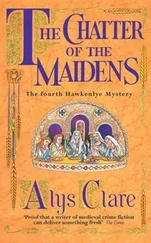Alys Clare - The Paths of the Air
Здесь есть возможность читать онлайн «Alys Clare - The Paths of the Air» весь текст электронной книги совершенно бесплатно (целиком полную версию без сокращений). В некоторых случаях можно слушать аудио, скачать через торрент в формате fb2 и присутствует краткое содержание. Жанр: Исторический детектив, на английском языке. Описание произведения, (предисловие) а так же отзывы посетителей доступны на портале библиотеки ЛибКат.
- Название:The Paths of the Air
- Автор:
- Жанр:
- Год:неизвестен
- ISBN:нет данных
- Рейтинг книги:3 / 5. Голосов: 1
-
Избранное:Добавить в избранное
- Отзывы:
-
Ваша оценка:
- 60
- 1
- 2
- 3
- 4
- 5
The Paths of the Air: краткое содержание, описание и аннотация
Предлагаем к чтению аннотацию, описание, краткое содержание или предисловие (зависит от того, что написал сам автор книги «The Paths of the Air»). Если вы не нашли необходимую информацию о книге — напишите в комментариях, мы постараемся отыскать её.
The Paths of the Air — читать онлайн бесплатно полную книгу (весь текст) целиком
Ниже представлен текст книги, разбитый по страницам. Система сохранения места последней прочитанной страницы, позволяет с удобством читать онлайн бесплатно книгу «The Paths of the Air», без необходимости каждый раз заново искать на чём Вы остановились. Поставьте закладку, и сможете в любой момент перейти на страницу, на которой закончили чтение.
Интервал:
Закладка:
The sudden relief giving her courage — anything else was better than another murder! — she put down her lantern and, with her free hand, picked at the very edge of the cloak, or perhaps it was a blanket, that covered the sleeping man’s head. But the action did not reveal very much, for he wore an enveloping headdress that swathed his head, came down low right over his brows almost to his closed eyelids and covered the lower part of his face, ending in a fold across the bridge of his nose. He had cushioned his cheek on his leather pack and one hand was tucked under the pack as if even in sleep he would not relinquish his hold.
She stared down at her unexpected guest. What she could see of the skin around his eyes was dark, although smooth and unlined. He was a young man, then. She looked down at the hand tucked under the satchel; it was palm up, and the satchel covered it as far as the wrist. The flesh of the inside of the wrist looked pale; she could see a blue lace of veins and there was the faint bump, bump, bump of a steady, regular pulse.
This poor man is exhausted, Helewise thought.
What shall I do?
He must have come into the Abbey in the stream of those seeking our help and then crept in here once the community had left after compline. He must, she thought with a frown, reckon on waking up and slipping out before matins…
She was inclined to leave him. He was warmly wrapped up, he looked quite comfortable — the wooden chest would undoubtedly offer a friendlier bed than the hard stone floor — and quite obviously was in dire need of sleep. She would go to her own bed, she decided, but she would not undress. She would make sure she was up at the first stroke of the call to matins so that she could get down here first, wake him up and perhaps offer him the care of either the infirmarer if he was unwell or the refectory nuns if, as undoubtedly he would be, he was hungry.
Pleased to have resolved the small matter, she bent down to pick up her lantern.
It was some tiny difference in the man’s breathing that alerted her, but it was too late: a hand shot out from the heaped garments and grabbed her wrist. The man on the chest sat up, shrugged off his blanket and cloak and swept up his other hand, in which she saw a long, curved knife. Its wicked point was a hand’s breadth from her throat.
Summoning every bit of her courage, praying that her voice would not give away her fear, she said, ‘I mean you no harm. I do not know how you come to be here in the church but clearly you need to sleep and I was going to leave you here until morning.’
The knife was held steady as a rock but she thought — hoped — that the man had lowered it a little.
‘This is God’s house and all who love him are welcome,’ she went on in the same calm, level tone. ‘It may be that you do not wish anyone to know you are here, in which case you could claim sanctuary and be safe from violence or arrest.’
The shadowed eyes watched her warily but still the man did not speak.
‘I am sorry that I startled you,’ she went on. ‘It must have given you quite a jolt, to wake up suddenly from profound sleep and find someone bending over you!’ She forced a laugh. ‘I would have been quite terrified, under the circumstances.’
At last the man spoke. In a low, hoarse, hesitant voice that she had to strain to hear, he whispered, ‘I am not afraid of you.’
‘Good, that’s good,’ she said. She held up the lamp so that he could see her face. ‘I am in holy orders, as you can see, and we are vowed to love our fellow men. We do not do them harm.’
He nodded; a quick, curt movement, his eyes fixed on hers.
‘Will you not accept a more comfortable bed?’ she suggested. ‘There will be a nun on duty in the infirmary. I could take you there — it’s not only the sick who sleep within. When they are in need, the healthy accept its comforts too.’
‘No,’ the man said in a low growl. ‘I do not — I did not want anyone to know I was here.’
‘But now I know,’ she pointed out.
‘You not tell!’ he hissed.
‘No, very well,’ she agreed. ‘But why are you here? Are you in truth in hiding? Do you wish to claim sanctuary?’
He regarded her steadily. Now the knife was pointing at her heart, although she was almost sure he had no intention of harming her. ‘In hiding, yes,’ he said. His eyes glittered in the light of her lamp; she could see five tiny flames reflected. Then he drew away, pulling the headdress still lower so that his eyes were in its shadow.
She thought suddenly, we could be here all night in this stand-off. She had guessed who he was and she said decisively, ‘You are Fadil, aren’t you? You came here to England with a monk from the Order of the Knights Hospitaller, whose prisoner you once were, and not long ago you asked a man who lives near here if you could stay in his outbuilding. You told him your name was John Damianos. Isn’t that so?’
His reaction greatly surprised her. In a strange echo of Thibault’s response when Josse suggested it was Fadil who turned up at New Winnowlands, this man too seemed to be amused. He went further, however, and she thought she heard a faint and muffled laugh. ‘Fadil?’ he said. Then, curtly, ‘Fadil not here.’
‘But you have been travelling with the English monk, haven’t you?’ she persisted. It suddenly struck her that taking this man to the infirmary was not a good idea, since Thibault and Brother Otto might well recognize their monk’s companion; she said, ‘Two of the runaway’s brethren are looking for him. They are called Thibault of Margat and Brother Otto. They were hurt in a fire and they are recovering here in the infirmary.’
‘I know,’ he whispered. She tried to catch the cadence of his voice but it was difficult when he spoke so softly and huskily. She thought he was young, his voice not long broken to manhood.
‘Others were hunting you too, weren’t they?’ She longed to put out a hand to touch him but she did not dare; he might have lowered the knife but he still held it. ‘There were two Saracen warriors called Kathnir and Akhbir and they killed a man they thought was you. They tormented him before they killed him and we assume that was because they thought he — or, rather, you — carried a precious object that they were desperate to find.’
His eyes widened in surprise. ‘You — have discovered much,’ he rasped.
‘We think there is a third group who hunt you,’ she went on, her confidence growing. ‘Men of their number are skilled with the bow. It was-’ She had been about to say that one of the unknown group had killed Kathnir, but she stopped. It was not wise to reveal too much too soon.
‘You think correctly,’ he muttered. Then, putting down the knife, he said, ‘There is abbess here?’
‘Er-’ Should she tell him who she was? Again, caution prevailed: ‘Yes, that’s right. Abbess Helewise.’
‘She is good woman?’
How, Helewise wondered, should she answer that? ‘They say so,’ she said guardedly.
‘And fair? Just?’
‘She would not condemn anybody without hearing what they had to say,’ she said firmly. ‘Even then her inclination would be towards mercy rather than condemnation, for she does her best to follow in the steps of her master, Our Lord.’
‘This is what I have heard,’ the man whispered.
‘Why do you ask?’
He looked at her for what seemed a long time. She sensed tension in the air like crackling frost. Then he growled, ‘I have come a very long way and I have been threatened over every mile and at every turn by these three parties. One party alone hunts for me. The others search for the Englishman.’
‘The runaway monk,’ she said, wanting to be quite clear.
‘He is not-’ The man stopped. ‘Yes.’
Читать дальшеИнтервал:
Закладка:
Похожие книги на «The Paths of the Air»
Представляем Вашему вниманию похожие книги на «The Paths of the Air» списком для выбора. Мы отобрали схожую по названию и смыслу литературу в надежде предоставить читателям больше вариантов отыскать новые, интересные, ещё непрочитанные произведения.
Обсуждение, отзывы о книге «The Paths of the Air» и просто собственные мнения читателей. Оставьте ваши комментарии, напишите, что Вы думаете о произведении, его смысле или главных героях. Укажите что конкретно понравилось, а что нет, и почему Вы так считаете.












